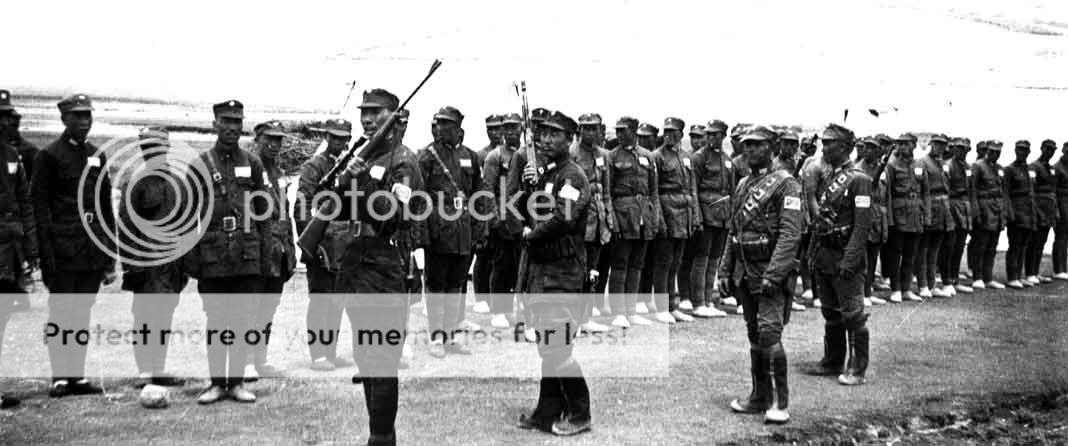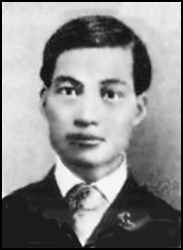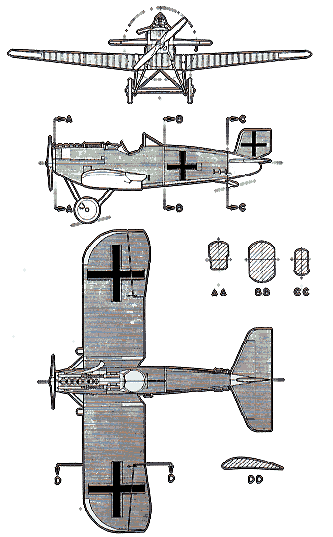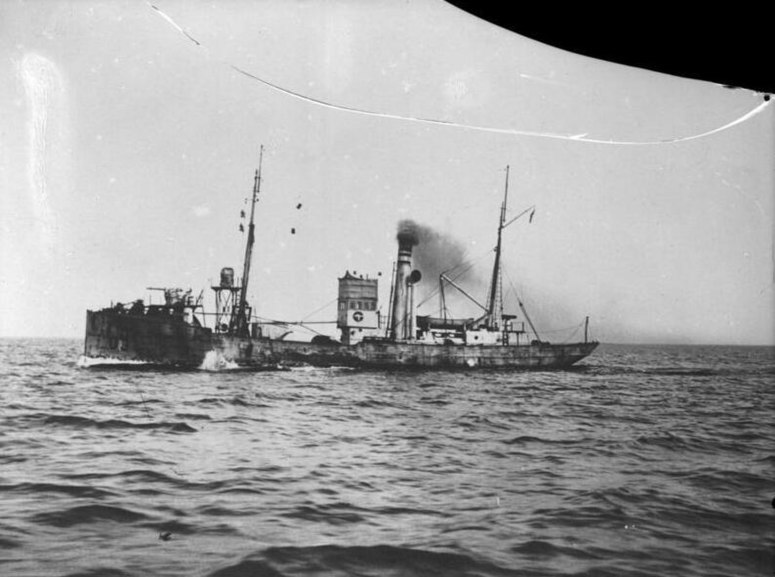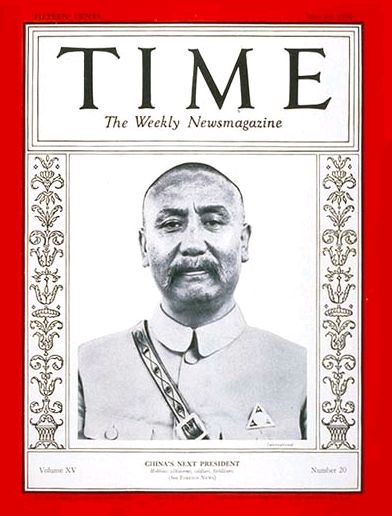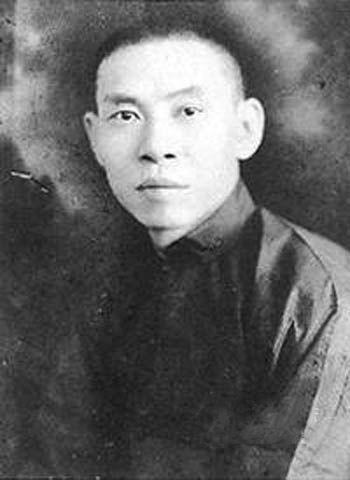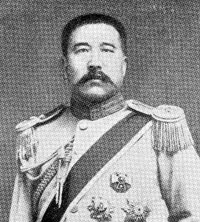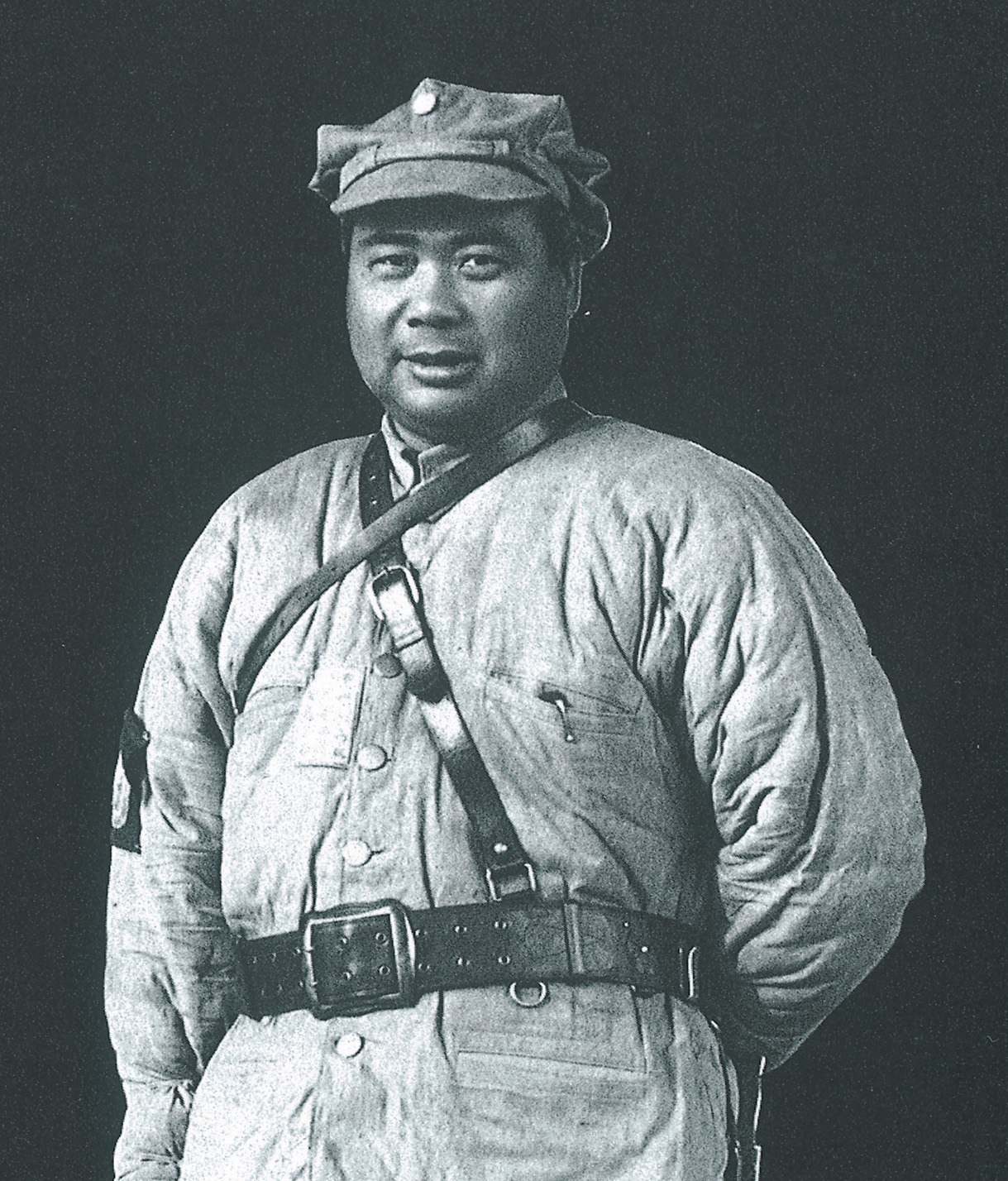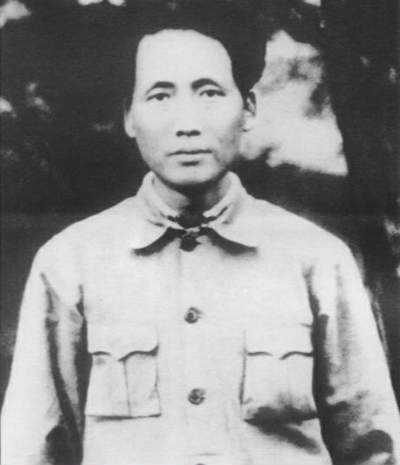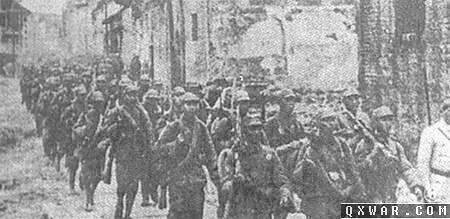Hi All,
I've just read Jonathan Fenby's book "Generalissimo Chiang Kai-Shek and the China He Lost" and it says that Chiang was considering going to Germany in 1912 to 'further his training'
What would have happened if he had?
(This is my first timeline)
The German Period: The Years of Blood and Iron 1912-1918
1912:
Chiang Kai-Shek shoots a rival of Chen Qimei dead. Fearing retaliation he decides to flee to Germany and tries to enlist in the prestigious Prussian Military Academy. ( This is the POD, IOTL he flees to Japan) Lacking the qualifications and support from a higher source needed, he is turned down.
He eventually drifts to Vienna, being degraded into employment as an 'exotic' fortune teller. His social circle consists of down-and-out-of-luckers like himself. In Vienna he first meets Adolf Hitler, the two become fast friends. He learns much of his German from Hitler and this social cricle.
He eventually bluffs his way into a place in the Die bayerische Kriegsakademie (The Bavarian War Academy) barely passing the entrance exam near the end of the year.
1913:
Chiang Kai-Shek finds the Bavarian War Academy tough going. His command of German, while vastly improving is initially quite basic. However he persists, barely passing the various tests and examinations. Chiang however is quite frustrated at this and yearns to learn 'in the field.'
Chiang rents a cramped little room in Munich with his friend Adolf Hitler who has moved to Munich to 'live in a real German city.'
1914:
At the outbreak of the First World War, Chiang Kai-Shek makes a decision to learn the trade 'in the field' and asks permission from the Academy to enlist in the Bavarian Army. The War Academy receives countless of those petitions and approves them all, most with the starting rank of "Feldwebel" or Sergeant. However due to Chiang's mediocre performance and basic command of German his starting rank is merely that of a "Gefrieter" or Lance Corporal.
Chiang's close friend Adolf Hitler also petitions to join the Bavarian Army.
The two men are overjoyed to find that they have been assigned to the same Regiment - the 16th Bavarian Reserve Regiment or Regiment List. However the joy quickly turns to elation as the two realize that they have been assigned to a different company. The two bid their farewells saying "see you in the Trenches."
The two take part in the Battle of Ypres, the companies they have been assigned in suffer horrific casualties. Chiang's original company of 250 has been reduced to 39, Hitler's company has been reduced to 45. The two do indeed meet again when their companies are merged after the Battle.
Their consolidated unit is posted near Messines where the two save each others life on two separate occasions. Chiang proves to be very courageous and an uncanny knack of predicting when and where an artillery shell is about to land, he pushes his friend out of the way in one instance.
Chiang's valour is noted and he is chosen to lead a trench raid where his friend, Adolf volunteers. Chiang successfully leads the raid but is shot in the leg as he is the last to leave the raid and is left on No Man's Land. After realizing this, Hitler dashes forward and retrieves his friend. In doing so he catches the attention of several officers who note that 'he would make a good runner,' Hitler is reassigned to Regimental headquarters and spends the rest of the war as a Runner. He is later awarded the Iron Cross, 2nd Class.
Chiang recuperates for the rest of 1914 recuperating in a military hospital. He is lucky that the shot does not damage any major organs and he makes a full recovery.
1915:
Chiang returns to front-line duty. He fast acquires a reputation for courage and efficiency, leading many successful trench raids. In recognition of this, he is awarded the Iron Cross, 2nd Class. The first non-German to be given the award in a combat capacity.
Hitler also aquires a reputation for bravery under fire and his ability to get accross messages despite being under heavy fire. He is promoted to the rank of Gefrieter.
1916:
Chiang fights in the Battle of the Somme. His courage under fire and resolve inspires the soldiers around him being called "Chiang the Fearless." He successfully knocks out a tank by throwing a grenade in the barrell. For this he is promoted to the rank of "Unteroffizier" or Corporal. Ludwig III catches wind of his exploit and writes him a letter of commendation praising him for his 'invaluable service' and 'courage in the field of battle.' Chiang is also featured in the Army newspaper.
Hitler is wounded in the early stages of the Battle of the Somme and reads about his good friend's exploits. He writes Chiang a letter sending him his hearty congratulations. His injuries force him to spend the rest of the Year in hopsital. When Chiang manages to secure leave he visits Hitler.
1917:
Chiang's notoriety grows in the Ypres Salient, he leads several more trench raids. In one action a group of 6 men to take 32 New Zealanders prisoner. In recognition of this, as well as Ludwig III's letter and the attrition rate among NCOs, Chiang is promoted to "Feldwebel" or Sergeant. Chiang is quickly becoming a good leader and an exellent practitioner of infantry tactics, inspiring his men through example. He is hit by shrapnel in the opening stages of the Battle of Paschendale and recuperates in a military hospital.
When he hears of China's declaration of War against Germany in August, he writes a letter back home to a major newspaper condemming the "Ruling clique" as a "pack of fools and jackals" berating them for being on the "wrong, losing side of the war." This causes quite a stir and attracts the attention of Ludendorf who after reading Chiang's exploits visits him in person and describes as a "model soldier - learned, brave and resolute." Ludendorf admits he is quite surprised given that Chiang is not German. He also receives a visit from his friend Hitler.
Chiang is further elated when he discovers that he has been promoted to Sekondelieutenant (2nd Lieutenant.) His joy quickly turns to mixed feeling when he realizes that he will be transfered out of Regiment List and has been handpicked by Ludendorf to lead one of the spearhead platoons in the coming Spring Offensive.
Hitler continues to give distinguished service as a runner. He is awarded the Iron Cross, First Class by the end of the year after leading back a 'lost platoon' of German troops from No Man's Land.
1918:
Chiang and his platoon are one of the leading echelons in the Somme Offensive. He commands his platoon with valour and efficiency leading them all the way to Albert. Chiang is wounded once again, this time by an Entete strafing attack but not before he manages to bring down one allied aircraft.
Chiang has moderate injuries with bullets passing through his sides and arms - he is told by the Doctor that it will take until December 1918 for him to fully recover.
Chiang is visited by Lundendorf again in October 1918, plummeting German morale means that everything must be done to bolster morale. Chiang is promoted to Hauptmann (captain) and sent back in a propaganda capacity to his original List Regiment in the Ypres sector. Chiang spends most of his time in Regimental Headquarters filling out various bits and pieces of paperwork and talking to his friend Adolf.
Adolf continues to give distinguished service as a runner. At Chiang's recommendation he is promoted to Unteroffizer. He is gassed and temporarily blinder near Wervicq on the 13th of October. When he returns on November 1 he is made Chiang's adjutant and promoted to Feldwebel.
November:
Both men react bitterly at the news of the Armistice. Both believe that Germany has been 'stabbed in the back' by civilian elements
December:
Both men part ways. Chiang Kai-Shek returns to China, a decorated and battle hardend veteran with a bright future to look forward too. Men who have had combat experience are valuable in a country rife with conflict and warlordism. Chiang tries to convince Adolf to go with him, but Adolf refuses saying that he must stay to "save his country." On the surface, this seems delusional, Hitler is returning to a country with many men like him - weary, combat hardened veterans with no other skill other than killing. Chiang and Adolf promise to stay in touch.
Any comments and feedback welcome (please)
Next Update: The Warlord Decade 1919-1929
I've just read Jonathan Fenby's book "Generalissimo Chiang Kai-Shek and the China He Lost" and it says that Chiang was considering going to Germany in 1912 to 'further his training'
What would have happened if he had?
(This is my first timeline)
The German Period: The Years of Blood and Iron 1912-1918
1912:
Chiang Kai-Shek shoots a rival of Chen Qimei dead. Fearing retaliation he decides to flee to Germany and tries to enlist in the prestigious Prussian Military Academy. ( This is the POD, IOTL he flees to Japan) Lacking the qualifications and support from a higher source needed, he is turned down.
He eventually drifts to Vienna, being degraded into employment as an 'exotic' fortune teller. His social circle consists of down-and-out-of-luckers like himself. In Vienna he first meets Adolf Hitler, the two become fast friends. He learns much of his German from Hitler and this social cricle.
He eventually bluffs his way into a place in the Die bayerische Kriegsakademie (The Bavarian War Academy) barely passing the entrance exam near the end of the year.
1913:
Chiang Kai-Shek finds the Bavarian War Academy tough going. His command of German, while vastly improving is initially quite basic. However he persists, barely passing the various tests and examinations. Chiang however is quite frustrated at this and yearns to learn 'in the field.'
Chiang rents a cramped little room in Munich with his friend Adolf Hitler who has moved to Munich to 'live in a real German city.'
1914:
At the outbreak of the First World War, Chiang Kai-Shek makes a decision to learn the trade 'in the field' and asks permission from the Academy to enlist in the Bavarian Army. The War Academy receives countless of those petitions and approves them all, most with the starting rank of "Feldwebel" or Sergeant. However due to Chiang's mediocre performance and basic command of German his starting rank is merely that of a "Gefrieter" or Lance Corporal.
Chiang's close friend Adolf Hitler also petitions to join the Bavarian Army.
The two men are overjoyed to find that they have been assigned to the same Regiment - the 16th Bavarian Reserve Regiment or Regiment List. However the joy quickly turns to elation as the two realize that they have been assigned to a different company. The two bid their farewells saying "see you in the Trenches."
The two take part in the Battle of Ypres, the companies they have been assigned in suffer horrific casualties. Chiang's original company of 250 has been reduced to 39, Hitler's company has been reduced to 45. The two do indeed meet again when their companies are merged after the Battle.
Their consolidated unit is posted near Messines where the two save each others life on two separate occasions. Chiang proves to be very courageous and an uncanny knack of predicting when and where an artillery shell is about to land, he pushes his friend out of the way in one instance.
Chiang's valour is noted and he is chosen to lead a trench raid where his friend, Adolf volunteers. Chiang successfully leads the raid but is shot in the leg as he is the last to leave the raid and is left on No Man's Land. After realizing this, Hitler dashes forward and retrieves his friend. In doing so he catches the attention of several officers who note that 'he would make a good runner,' Hitler is reassigned to Regimental headquarters and spends the rest of the war as a Runner. He is later awarded the Iron Cross, 2nd Class.
Chiang recuperates for the rest of 1914 recuperating in a military hospital. He is lucky that the shot does not damage any major organs and he makes a full recovery.
1915:
Chiang returns to front-line duty. He fast acquires a reputation for courage and efficiency, leading many successful trench raids. In recognition of this, he is awarded the Iron Cross, 2nd Class. The first non-German to be given the award in a combat capacity.
Hitler also aquires a reputation for bravery under fire and his ability to get accross messages despite being under heavy fire. He is promoted to the rank of Gefrieter.
1916:
Chiang fights in the Battle of the Somme. His courage under fire and resolve inspires the soldiers around him being called "Chiang the Fearless." He successfully knocks out a tank by throwing a grenade in the barrell. For this he is promoted to the rank of "Unteroffizier" or Corporal. Ludwig III catches wind of his exploit and writes him a letter of commendation praising him for his 'invaluable service' and 'courage in the field of battle.' Chiang is also featured in the Army newspaper.
Hitler is wounded in the early stages of the Battle of the Somme and reads about his good friend's exploits. He writes Chiang a letter sending him his hearty congratulations. His injuries force him to spend the rest of the Year in hopsital. When Chiang manages to secure leave he visits Hitler.
1917:
Chiang's notoriety grows in the Ypres Salient, he leads several more trench raids. In one action a group of 6 men to take 32 New Zealanders prisoner. In recognition of this, as well as Ludwig III's letter and the attrition rate among NCOs, Chiang is promoted to "Feldwebel" or Sergeant. Chiang is quickly becoming a good leader and an exellent practitioner of infantry tactics, inspiring his men through example. He is hit by shrapnel in the opening stages of the Battle of Paschendale and recuperates in a military hospital.
When he hears of China's declaration of War against Germany in August, he writes a letter back home to a major newspaper condemming the "Ruling clique" as a "pack of fools and jackals" berating them for being on the "wrong, losing side of the war." This causes quite a stir and attracts the attention of Ludendorf who after reading Chiang's exploits visits him in person and describes as a "model soldier - learned, brave and resolute." Ludendorf admits he is quite surprised given that Chiang is not German. He also receives a visit from his friend Hitler.
Chiang is further elated when he discovers that he has been promoted to Sekondelieutenant (2nd Lieutenant.) His joy quickly turns to mixed feeling when he realizes that he will be transfered out of Regiment List and has been handpicked by Ludendorf to lead one of the spearhead platoons in the coming Spring Offensive.
Hitler continues to give distinguished service as a runner. He is awarded the Iron Cross, First Class by the end of the year after leading back a 'lost platoon' of German troops from No Man's Land.
1918:
Chiang and his platoon are one of the leading echelons in the Somme Offensive. He commands his platoon with valour and efficiency leading them all the way to Albert. Chiang is wounded once again, this time by an Entete strafing attack but not before he manages to bring down one allied aircraft.
Chiang has moderate injuries with bullets passing through his sides and arms - he is told by the Doctor that it will take until December 1918 for him to fully recover.
Chiang is visited by Lundendorf again in October 1918, plummeting German morale means that everything must be done to bolster morale. Chiang is promoted to Hauptmann (captain) and sent back in a propaganda capacity to his original List Regiment in the Ypres sector. Chiang spends most of his time in Regimental Headquarters filling out various bits and pieces of paperwork and talking to his friend Adolf.
Adolf continues to give distinguished service as a runner. At Chiang's recommendation he is promoted to Unteroffizer. He is gassed and temporarily blinder near Wervicq on the 13th of October. When he returns on November 1 he is made Chiang's adjutant and promoted to Feldwebel.
November:
Both men react bitterly at the news of the Armistice. Both believe that Germany has been 'stabbed in the back' by civilian elements
December:
Both men part ways. Chiang Kai-Shek returns to China, a decorated and battle hardend veteran with a bright future to look forward too. Men who have had combat experience are valuable in a country rife with conflict and warlordism. Chiang tries to convince Adolf to go with him, but Adolf refuses saying that he must stay to "save his country." On the surface, this seems delusional, Hitler is returning to a country with many men like him - weary, combat hardened veterans with no other skill other than killing. Chiang and Adolf promise to stay in touch.
Any comments and feedback welcome (please)
Next Update: The Warlord Decade 1919-1929
Last edited:

